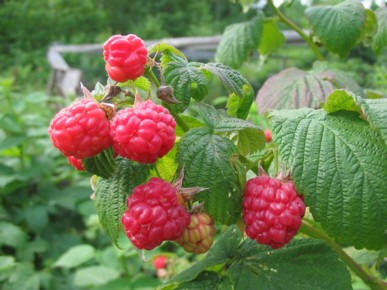Spotted Wing Drosophila (SWD) Update: July 30th. SWD Fruit Injury to ‘Prelude’ Raspberry in Southern Dutchess County

Our damage assessment of a 20 fruit sample showed 3 infested raspberries with both eggs and larva (15% fruit injury).
Trap captures showed two male and one female using a yeast/flour/sugar baited apple cider vinegar trap in a raspberry patch in Southern Dutchess County collected on July 30th.
We have observed raspberry and blackberry to be a favored host of the SWD, relative to blueberry and strawberry, requiring more intensive management strategies. In raspberry or blackberry patches where SWD have been captured and or fruit injury has been observed, management should begin at the first available application window to reduce adult populations and egg laying. In these cultivars a tight management schedule of 3-4 days may be needed if populations continue to increase. Rotating plots within a block may be needed to maintain daily harvesting while cleaning the brambles of all fruit to reset management and eliminate eggs and larva in fruit may be an important part of late season management. Removal and complete destruction of infested berries will also reduce newly developing populations to aid in management. Keeping fruit cold (34-38F) directly after harvest will arrest egg and larval development. Prolonged exposure to these low temperatures for 4d will dramatically reduce egg and larva survival.
Conventional and Organic Management Options for NYS grown small fruit:
Insecticides labeled in NYS to manage SWD
Spotted Wing Drosophila, Drosophila suzukii (SWD) is a vinegar fly native to East Asia. Established in the Eastern US since 2012, it has become an invasive insect pest of small fruit and to a lesser degree, cherry and grape. Information on insect biology.
Traps we are presently using are made of red plastic 16 oz. solo cups and lids with a black band of electrical tape. Traps are baited with apple cider vinegar (ACV), as the attractant killing solution. Approximately 30, 1/8″ holes, are drilled around the top 3/4 of the cup, leaving a 3′ gap to pour out the ACV solution in a strip of 2″ x 2″ netting to access the number of captured flies. A yeast, flour & sugar bait mixed with water is added to a 5 oz. fixed position cup along the top edge.
The Cornell Spotted Wing Drosophila web site hosts a map of the counties in which SWD is being trapped. Updates on presence based on trap findings can be found here.





